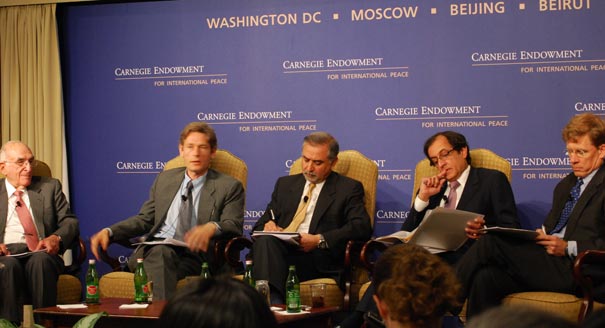Registration
You will receive an email confirming your registration.
Myanmar began a new chapter this Wednesday as Aung San Suu Kyi and her fellow National League for Democracy candidates took their oath as parliamentarians. The country’s political and economic reforms under President Thein Sein have raised hopes and expectations at home and abroad. But Myanmar’s challenges remain formidable. The economy is fragile, poverty abounds, hundreds of political prisoners are still behind bars, more than half a million refugees live abroad, and fighting continues with Kachin rebels in the north. How can Myanmar resolve its daunting challenges and what can the world do to help?
Tom Malinowski, Anoop Singh, David Steinberg, and Joseph Yun addressed these issues and provided recommendations for how the world can engage with and help Myanmar.
Recent Dramatic Changes
Nehru outlined some of the major changes that have happened over the last six months:
- Transition from Military Rule: Myanmar ended fifty years of military rule when the military regime was dissolved in 2011. However, the military retains critical veto powers and influence in the government and society. Permanent changes will require changes to the military’s role.
- Political Changes: President Thein Sein has reached out the opposition party, released political prisoners, freed pro-democracy advocate Aung San Suu Kyi, lessened restrictions on the media, lowered barriers to international trade and investment, and negotiated cease-fire agreements with all but one of Myanmar’s ethnic minority insurgent groups.
- Elections: Parliamentary by-elections were held in 2012 in which the opposition party, the National league for Freedom (NLD) led by the iconic Aung San Suu Kyi, claimed 43 of 45 seats in contention.
All of the participants agreed that while changes in Myanmar have been very encouraging, they are not irreversible.
The Continued Role of the Military
- Constitutional Issues: The constitution gives the military the authority to run all ministries tied to domestic security and does not make the military answerable to the parliament or the judiciary. Additionally, the military commander in chief can remove the civilian president in a state of emergency and the military has the power to veto changes to the constitution.
- Control of Resources: Whether the civilian government or the military has control of the country’s natural resources will be critical in determining whether Myanmar will develop into a country with civilian control of the military.
- Civil War: The conflict between the central government and the ethnic states is the longest running civil war in the world. Human rights violations by Myanmar’s military have exacerbated mistrust of the organization although there have been some members of the military concerned about abuses who had not had a voice until now.
An Economy in Transition
- Challenges from Increased Openness: Increased outside investment risks creating a rush to export Myanmar’s resources. It is important that the proceeds not go to the military or military owned businesses, which would lessen the military’s reliance on civilians and hamper democratization.
- Economic Potential: Myanmar has vast natural resources and a young labor force, giving the country significant economic potential. Myanmar’s place in the ASEAN community gives it additional benefits and support for reform.
- Institutions: Since Myanmar has a fragmented economy with many informal sectors, long-term high productivity growth depends on establishing institutions with good governance and some transparency.
- Positive Signs: Efforts to craft a new Central Bank law, a Foreign Direct Investment law, and land reform measures, and recent measures to fight inflation, are all positive initial signs of institution building in Myanmar.
Elections
- 2015 Elections: All of the participants agreed that the 2015 elections would be a critical juncture for fundamental change in Myanmar. Tensions over civilian control of the military will coalesce during those elections.
- Recent Parliamentary Elections: Recent parliamentary elections allowed Aung San Suu Kyi and other members of the NLD to gain seats in parliament. However, the results give the military an indication of changes that may come in 2015. For example, Aung San Suu Kyi’s chief priority is to change the constitution.
- Irreconcilable Conflict: The positions of the military and the opposition about civilian control of the military were “irreconcilable” and that the military will not want to lose the power it has held for the last fifty years.
Relations with the International Community
- U.S. Engagement: The U.S. policy of “principled engagement” with Myanmar began three years ago. Under this policy, Washington has pursued dialogue, including over issues such as human rights, unresolved ethnic conflicts, and Myanmar’s relations with North Korea. The United States has even appointed Ambassador Derek Mitchell as a special representative and policy coordinator for Myanmar.
- China: U.S. sanctions pushed Myanmar into deeper relations with China. However, rising anti-China sentiment, spurred by concern over corrupt Chinese investors and environmental degradation, may have helped encourage Myanmar to welcome greater U.S. engagement. Myanmar and China will continue to have deep economic ties and trade linkages.
